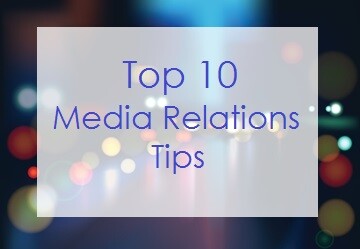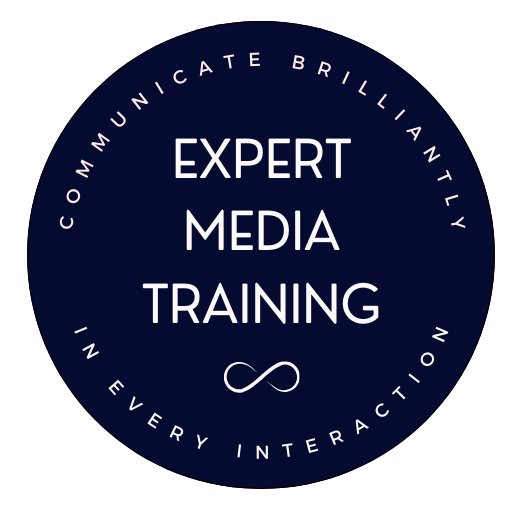Friday, August 24, 2012 | Media Relations, Media Training, Messaging
 Media training is about much more than your delivery on camera. Good media trainers educate you on how to work well with all types of people who work in the media — TV producers, radio producers, print editors and writers. They each have specific needs, but there are some things that many members of the media who I have interviewed agreed upon. This is the list of media relations tips that I created, based on what I have learned while working with the media over the last 20+ years.
Media training is about much more than your delivery on camera. Good media trainers educate you on how to work well with all types of people who work in the media — TV producers, radio producers, print editors and writers. They each have specific needs, but there are some things that many members of the media who I have interviewed agreed upon. This is the list of media relations tips that I created, based on what I have learned while working with the media over the last 20+ years.
Top 10 Media Relations Tips from a Media Trainer
1. Be polite and respectful.
Editors, journalists and producers are paid to find stories that will interest their respective audiences. In essence, they are the experts on their particular media outlets. If they tell you that your story is not right for their audience, believe them. This does not mean, however, that you can’t offer them another story unless they have told you that YOU are not right for their respective media outlets. Good manners go a long way, too.
 2. Know your message.
2. Know your message.
You should be so clear on your key messages (i.e., the most important golden nuggets of wisdom you want to share with the world) that you can leave concise voice mail messages or answer questions quickly. (This is one of the first things I work on with my clients.)
3. Read the nonverbal, aural cues.
If you are speaking to a member of the media on the phone and he or she sounds very busy, quickly explain the highlights of your pitch and offer to send the rest of the information via e-mail.
4. Sometimes less is more.
Many media pros have said that they don’t have a lot of time to read through long e-mails, so a couple of paragraphs are all they want.
5. Don’t send attachments with your emails, unless they’re requested.
Most members of the media don’t want you to send attachments with your emails, unless they request them. Put your pitch into the body of the e-mail. Offer to send photos or include links to photos in your e-mail. (Don’t expect the media to download photos from ftp sites: they’re too busy for that.) If you have to send several photos at once, consider using Hightail or another service that allows you to send large files. This will eliminate the need to send several e-mails with photos. It’s all about making it easy for the members of the media to work with you.
 6. Include video links in your e-mails when pitching the media.
6. Include video links in your e-mails when pitching the media.
Make it easy for TV producers to see how fabulous you are on camera. Now, many print outlets and radio shows want video to post on their web sites, so include the video links in all your pitches.
7. Respond to media requests quickly, usually within 24 hours or less.
When writers and producers are working on a story they are usually under a tight deadline. If you don’t respond quickly they may move on to someone else.
8. Don’t try too hard to control the story.
I have seen people lose press opportunities because they tried to re-schedule a TV shoot or they have pushed to have certain content included, instead of what the producer or writer wanted to cover initially. You can offer your ideas, but pushing too hard can unravel a great media placement. Good media relations are developed when you are aware of the difference between a paid ad and a press opportunity. They are vastly different.
9. Offer extra valuable information.
If you have pertinent information, such as common misconceptions or new research, that could help the producer or writer with his/her story, offer it. Members of the media count on experts they interview to fill in the blanks for them.
10. Be prepared.
When you have an interview scheduled, be sure you’re ready! Have your press kit together, have your elevator pitch and key messages so set that they just spill out of you naturally and get media training.
Lisa Elia

If you want to find out if my media training services are a good fit for you, set up a complimentary consultation call.
Here are links to other articles with valuable media relations and media training tips:
For a Media Interview Checklist to keep on hand, click here.
To read my Top 5 Mistakes to Avoid in Media Interviews, click here.
To read How to Create an Online Press Room That the Media Will Love, click here.
For Media Training Tips on The Language of Your Brand in Media Interviews, click here.
Prepare for TV Interviews BEFORE You Book One. Click here.
If you would like to reach our office, call 310-479-0217.

Monday, August 6, 2012 | Communication, Confidence, Media Training, Public Speaking
Quite often we’re unaware of the little ways in which we tell people exactly what we think of ourselves. I’ve heard people say things like, “It’s been such a tough year; we’re really struggling,” or “Well, I have a little business I run out of my living room,” or “I’m just getting started so my business is really small.”
Just hearing yourself say those words aloud reinforces small, limited thinking and a self-image that isn’t as professional or successful as the image you’d probably like to have of yourself. While you don’t have to pretend to be something you’re not, you can frame things in a way that’s more proactive, positive, and expansive.
Here are some tips on how to communicate your story effectively:
1. Most people don’t want to do business with someone who’s “really struggling” because they may fear that you only want their business because you need the money. Most people want to feel that you are selling them your product or service because it’s truly a good fit for them. Save your tales of woe for people who are not your potential clients or key influencers who could refer clients to you, and don’t allow others’ negative talk to bring you down. (An aside about struggle: Stuart Wilde wrote a great little book called, Life Was Never Meant to Be a Struggle, in which he stated that everything requires effort, but struggle only comes into play when we assign it emotion. Choose to stay out of struggle.)
2. If you have a small company, are there advantages to that? Perhaps, you could present your company’s small size as a benefit, such as, “We’re a boutique firm that provides great personal service to our clients.”
3. Choose to speak in a manner that reflects your best self and your brand. For example, if you’re a relationship expert, communicate warmly and expressively so people perceive that you’re coming from a place of understanding how people think and feel. People sometimes ask me if it’s okay to use profanity. My answer is, “If that suits your brand, then yes!”
r. Do the words you’re saying instill confidence that you can deliver the results your clients desire from you? There was a fitness trainer who used to run around saying, “I’m so stressed out.” A friend noted that being “so stressed out” probably was not appealing to her clients or potential clients who sought out fitness as a way to relieve stress. So true!
Take the Talk Test
Audio record yourself in various situations, including:
• when you attend a business or networking event, so you can learn how you present yourself to strangers;
• when you’re conducting new business meetings/sales presentations, so you can hear what your prospective clients/customers hear;
• and when you’re talking to your family and friends because it’s often with those closest to us that we play down what we do and try to fit into others’ limited views. Yet, this is one of the most important times to NOT do this.
Rewrite Your Story
If you hear yourself speaking in ways that don’t present you or your company in the best light, do this exercise.
1. Write out, word for word, each sentence you spoke that felt weak or made you appear less confident than you’d like to be.
2. Think about how the most self-assured, established person in your field would present and feel about themself. Then, re-write each sentence in words you think this person would use.
3. When you have your new, more confident statements written out, read them aloud. While you don’t want to memorize statements, exercises like this will help you change your communication style.
Your body language also impacts how you’re perceived. I cover this in other posts (see below) and in my programs. Focus on how you speak and who you’re being in every situation to communicate your story most effectively.
Your brain absorbs every word you speak.
Say good things!
Here are other articles you might enjoy:
Body Language in Interviews and Meetings – Nonverbal Communication
Authenticity and Your Message
Would you like more tips and articles delivered straight to your inbox?
Click here.

 This post was written by Lisa Elia, a media trainer, presentation trainer, pitch coach, communication expert, and speaker. She trains clients around the world for media interviews, speeches, internal and external presentations, panels, investor presentations, and promotional videos, and provides executive and team communication coaching.
This post was written by Lisa Elia, a media trainer, presentation trainer, pitch coach, communication expert, and speaker. She trains clients around the world for media interviews, speeches, internal and external presentations, panels, investor presentations, and promotional videos, and provides executive and team communication coaching.
With more than 25 years of experience, Lisa has prepared clients for interviews with TODAY, GMA, The Wall Street Journal, CNN, ESPN, and hundreds of other outlets. Lisa has shared her expertise with national media outlets that include Inc., Entertainment Tonight, E!, and many others. Clients include entrepreneurs, Fortune 500 companies, and everything in between as well as athletes, celebrities, and other public figures.
Wednesday, July 11, 2012 | Media Training, Messaging, Social Media

Authenticity and honesty are integral to creating a strong business and brand. However, this does not mean you must divulge everything about your business, nor should you.
During economic downturns, I’ve heard business owners and entrepreneurs complain about how hard it is and how tough business had become. While people need to vent and express themselves, it’s important to consider several things before you open your mouth or hit your keyboard.
Ask yourself these questions before you speak negatively:
• What is the purpose of this communication?
• Is this conversation going to help me propel my business forward?
• Will complaining about what I believe is my current state of being help me?
• Will this behavior attract or repel potential clients or referral sources?
• Is there a more proactive way I can express my desire for more business and possibly elicit help, ideas or referrals?
Some proactive communications strategies you might consider:
Communication tip #1: Survey clients or potential clients about what they need or want most. In addition to providing you with insight about products and services your clients and potential clients are seeking, this will get your clients interacting with you and your brand and could remind them you’re there and may even result in sales.
Communication tip #2: Let people know that you “have room for” more clients or business. This does not sound desperate, especially if you avoid the word “need.” Even busy, successful people let others know when they have room for more clients or business, which is why they’re busy and successful.
Communication tip #3: Tell people of other opportunities you’re seeking, such as speaking engagements or ad trade opportunities.
 Communication tip #4: Be creative and approach businesses that provide products and services that complement yours with the idea of cross-promoting your products or services.
Communication tip #4: Be creative and approach businesses that provide products and services that complement yours with the idea of cross-promoting your products or services.
Communication tip #5: If you have extra time on your hands, use it to promote yourself or your company. Use this time to write articles, pitch ideas to the media or put together a talk that you could present to a group of business people or others you’d like to reach.
Communication tip #6: Ask what you can do to help others promote their business. An introduction you make could help someone bring in more business, and most of us have learned, what goes around comes around. Plus, it feels good to help people grow their businesses.
A few communication tips to remember:
Be positive. People are more likely to get involved with a hopeful cause than a hopeless one. Be as positive as you can be. If you begin to use more positive words, you can even change your mind and your mood.
Don’t say it if you wouldn’t want it etched in stone. Consider that everything you write on your website, blog, Twitter or Facebook can live on forever. The same goes for e-mails and even phone conversations. As Oprah says, “I don’t write anything in an e-mail that I wouldn’t want to see in the New York Times.” It’s a good rule to follow.
Choose your confidantes wisely. If you really feel the need to share negative feelings or fears, do so with a few trusted friends or colleagues. This doesn’t mean you’re being false with everyone else; it just means you’re doing what’s best for your business. If you present yourself and your business as something that is vital and evolving, clients will be more excited to work with you and referral sources will be more enthusiastic about referring business to you.
Words have power. Use them to your advantage.
Now that you have a few communication tips, would you like some additional media training resources and tips?
If so, visit these links on our site:
10 Things to Do to Become a Trusted Expert and Thought Leader, Tips from a Media Trainer and PR Expert
What is Influence and How Do You Increase It? Tips from a Media Trainer
 Media training is about much more than your delivery on camera. Good media trainers educate you on how to work well with all types of people who work in the media — TV producers, radio producers, print editors and writers. They each have specific needs, but there are some things that many members of the media who I have interviewed agreed upon. This is the list of media relations tips that I created, based on what I have learned while working with the media over the last 20+ years.
Media training is about much more than your delivery on camera. Good media trainers educate you on how to work well with all types of people who work in the media — TV producers, radio producers, print editors and writers. They each have specific needs, but there are some things that many members of the media who I have interviewed agreed upon. This is the list of media relations tips that I created, based on what I have learned while working with the media over the last 20+ years. 2. Know your message.
2. Know your message. 6. Include video links in your e-mails when pitching the media.
6. Include video links in your e-mails when pitching the media.



 This post was written by Lisa Elia, a media trainer, presentation trainer, pitch coach, communication expert, and speaker. She trains clients around the world for media interviews, speeches, internal and external presentations, panels, investor presentations, and promotional videos, and provides executive and team communication coaching.
This post was written by Lisa Elia, a media trainer, presentation trainer, pitch coach, communication expert, and speaker. She trains clients around the world for media interviews, speeches, internal and external presentations, panels, investor presentations, and promotional videos, and provides executive and team communication coaching. 

